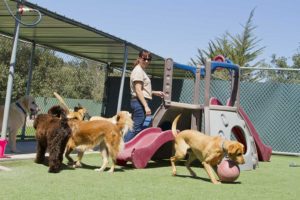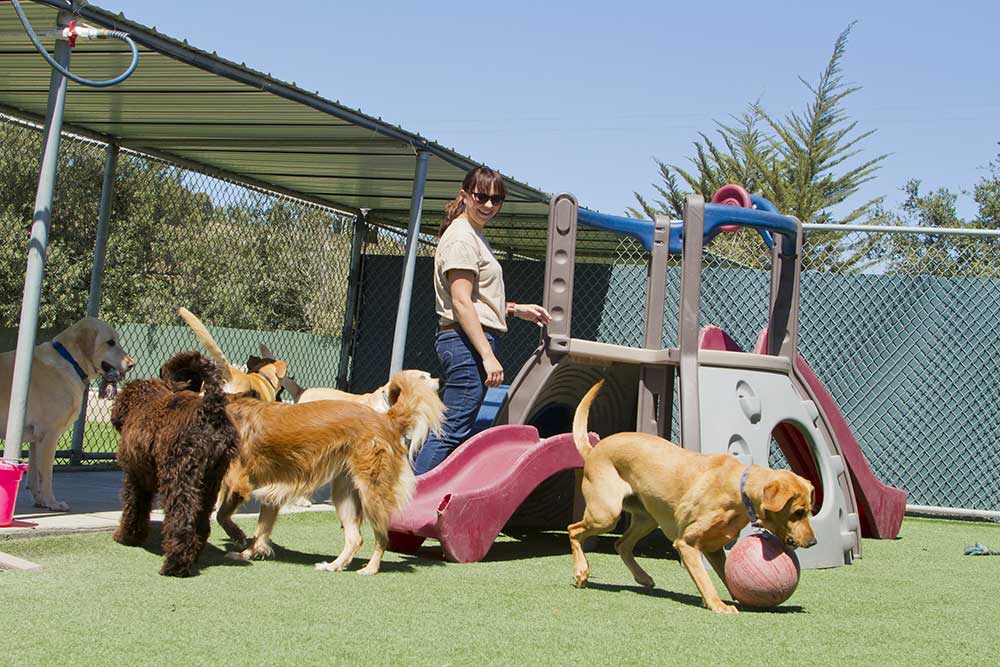Disclaimer: The information on our website is provided for general information purposes only. We make no representations or warranties of any kind, express or implied, about the completeness, accuracy, reliability, suitability or availability with respect to the website or the information contained on our website for any purpose. Any reliance on such information is therefore strictly at your own risk and we are not liable for any damages or losses arising out of or resulting from your reliance on any information contained on our website.
An animal care worker provides care for animals at veterinary clinics, zoos, kennels, pet stores, stables, or animal shelters (just to name a few). They may bath, groom, feed, and exercise animals. Some specialize in an area of interest such as marine mammals, horses, reptiles, or even behavioral training.
Watch a video to learn what an animal care worker does:
How to Become an Animal Care Worker

The level of education for animal care workers varies and depends on the requirements for the job you are seeking. For example caring for animals at kennels, pet stores, animal shelters, or pet sitting does not require more than a high school diploma and on-the-job training.In general most employers want you to have some experience working with animals. An excellent way to gain this is starting as a volunteer or interning at a zoos, animal parks, animal shelters, animal sanctuaries, or an aquarium.
If you hope to secure a better paying job working with animals, you generally must earn a bachelor’s degree in animal science or a similar field. You can do this at a state college or university. For those interested in professional grooming there are several schools available for certification. Dog and horse trainers also take courses at community colleges, private schools, or vocational schools.
Job Description of a Animal Care Worker
An animal care worker’s primary goal is to provide quality care for animals. They exercise, feed, bathe and/or groom them. If caged, they disinfect and clean animals to keep them safe and healthy. They interact with animals, play with them, and observe their behavior. They may record any information needed on the animals overall health. For example they look for noticeable illness, depression, or other symptoms that may require further care. Animal care workers also train animals to respond to certain commands. Some even specialize in training animals for the disabled or security.
Some animal care workers receive training in vaccinations of animals or euthanize them under supervision when necessary. Veterinary clinics and pet supply stores also employ pet groomers. At zoos animal care workers may be called keepers. They care for animals and duties may include the planning special diet requirements, cleaning and disinfecting cages/living environment, and monitoring the animal’s behavior or health. This particular area of animal care may require working with more than one type of animal or even interacting with the public. You may be answering questions and teaching people about the animals needs, habitats, behaviors, and importance of the protection of certain animals to prevent extinction.
Some animal care workers travel to animal competition shows. As you can see there are many areas of animal care workers to explore. A care worker should be in good physical condition as the job is both physically and mentally challenging. You will work irregular hours, including nights, weekends, and holidays because animals need care 24/7. Employment growth coupled with high turnover should result in a very good job opportunity for candidates for most positions in this industry.
Benefits of being an Animal Care Worker
The benefits of animal care workers depend on whether they are employed by a company, like a veterinary clinic or zoo, or are self-employed. Let’s break that down and look at those working in a professional setting instead of those who are not. For example, people working in veterinary clinics or zoos would have the usual benefits of sick leave, paid vacation, and health insurance. Those workers that are self-employed would need to provide their insurance. Animal care workers also like the opportunity to learn new skills. For instance, those employed in professional settings can learn about animal first aid, hydrotherapy, or take zoo courses. Those self-employed can also take first aid courses and develop skills with different animals, such as birds or turtles. The more you learn, the more advantages you have to further your career
Animal care workers develop friendships with animals that they see repeatedly. Thus, they look forward to spending time with each animal while being paid to do so! These workers are rarely bored as each animal is unique and has different needs and personalities. In fact, animal care jobs are perfect for those in school as they can earn extra money. In addition, some positions are flexible as a person may walk dogs, housesit pets.
Free Teacher and Student Resources
PETA (People for the Ethical Treatment for Animals) offers free classroom materials for teachers called TeachKind Materials. There are also free lesson plans (career opens in a new tab) you can access online as well.
Animal Keeper Career Video Transcript
Hi, my name is Juan Rodriguez and I’m an animal keeper her at the Smithsonian National Zoo. When I was a kid, I think the very first instance where I realized I loved animals was when my older brother would bring home injured pigeons, cats, dogs, and stray animals. I just fell in love with taking care of animals since I was 7 years old. Becoming a volunteer was the first stepping stone in getting into the system as a full-time employee. Basically, the love of working with animals was the main reason I got involved working at the National Zoo. It gave me the basics of understanding what my responsibilities were and what I needed to do to become a keeper.
After I was a volunteer for several months, I was able to get a job here. In terms of formal training, I didn’t have my degree when I first started back in 1997 but as time went on, I eventually obtained my bachelor’s of science degree in biology. On a day-to-day basis, when we come in the morning we want to make sure the animals are well, they’re not sick, and everything’s normal. We get a head count of all of the animals that we are in charge of and if there are any animals that need any medication or any special treats in the morning, we’ll give them their medications and then continue through our day.
An Animal Keeper’s Day-to-Day Job
After that, we’re involved with many things such as research, behavioral watches, cleaning stalls, you gotta do the dirty work too. Then also the basic things of actually talking to the public so they learn what the sloth bear is and what all the other animals on the nature trail are and learn what they can do about conservation. I think the favorite part of the job is when I’m actually talking to the public and they learn something new about an animal I work with. You can just see sort of a light bulb flash in their head like, “Wow, this is something really amazing I never knew this about this particular animal!” Then the other second favorite thing is when the animals are actually enjoying the enrichment we put in the yard for them.
If you love to work with animals is just follow your passion and your desire to work with animals. You can always find a way to do what you’re trying to accomplish. To learn more about the National Zoo and all of the animals that are here, visit nationalzoo.si.edu.
Article Citations
- Bureau of Labor Statistics, U.S. Department of Labor, Occupational Outlook Handbook, Animal Care and Service Workers.
- The career video is in the Public Domain by USA.gov, an interagency product administered by USAGov, a division of the U.S. General Services Administration’s Technology Transformation Service.

